Suzi Quatro: ‘I’ve always had a nice ass. I’m quite proud of it’
The rock’n’roller has taken bottom-pinchers in her stride and was thrilled to be named Rear of the Year. But King Charles made her blush like a little girl with a naughty aside, she tells Annabel Nugent, on an unforgettable afternoon in her Elizabethan Essex mansion (via ‘Devil Gate Drive’ of course)

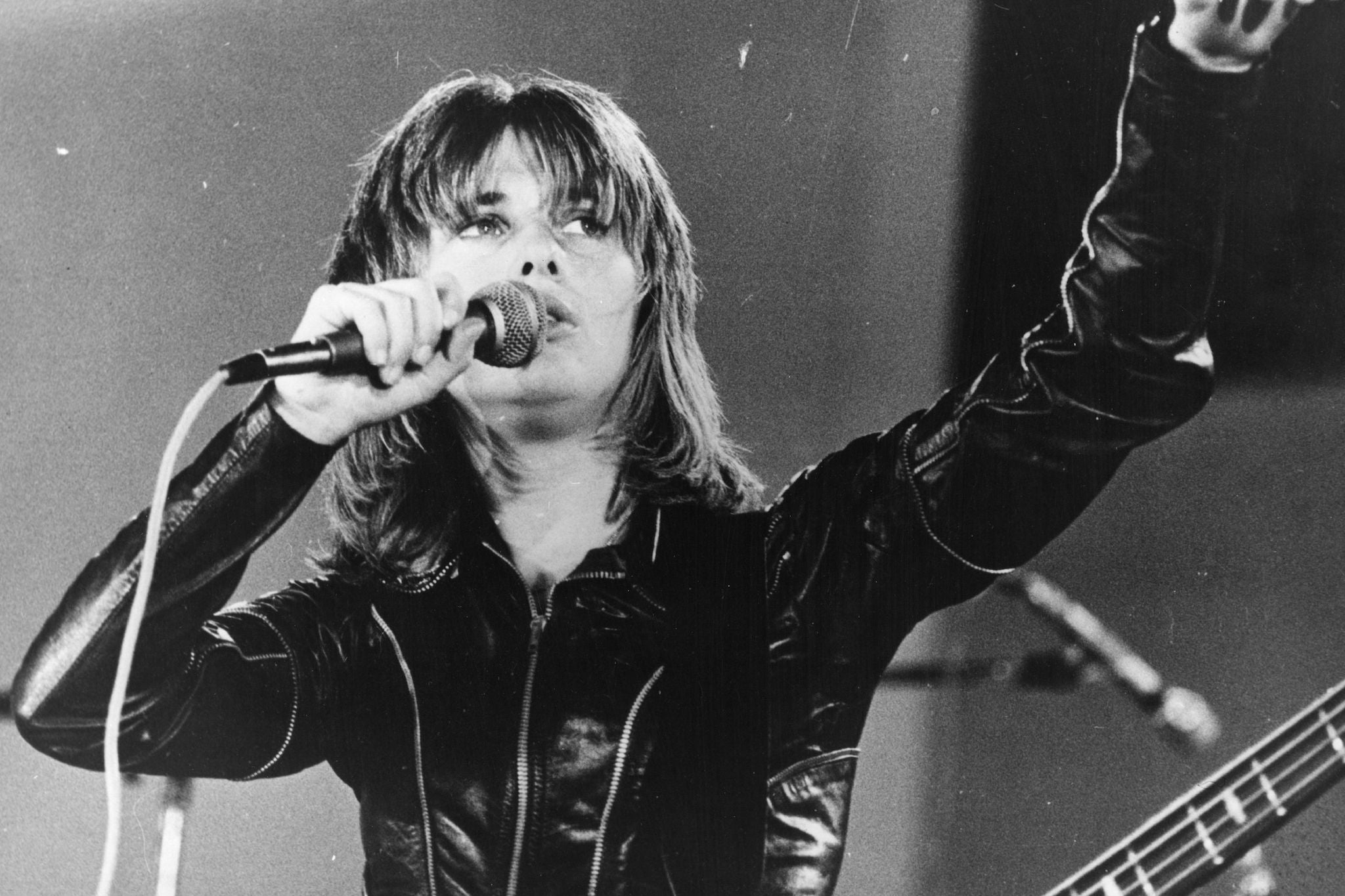
In 1982, rock star Suzi Quatro took pity on a 14-year-old fan in Australia. He had bought tickets to her show not realising it was an 18-and-over event, and so with the sort of pluck only a teenager can muster, he found out where she was staying, turned up and begged for entry. Never one to follow rules, Quatro said OK. He spent the night watching his mulleted, leather-clad idol perform from backstage in a cardboard box to evade roaming security. Four decades on, that boy, now in his fifties, greets me at the gates of Quatro’s Elizabethan manor house in Essex. Quatro and Pat remain very, very good friends.
The house, where Quatro has lived since 1980, was something of an impulse buy. The singer-songwriter and bassist saw the property on the cover of Country Life magazine and knew she had to have it. It’s a very Suzi Quatro quality, that heady mix of intuition and determination. The home itself is very Essex, very old: a listed, timber-framed property at the end of a long tree-lined driveway. Also, there is a moat. Inside are big sash windows and pristine beige carpet. “Shoes off or f*** off!” she wrote on a sign pinned to her front door during a Christmas party last year.
Beige carpets don’t much scream rock ‘n’ roll, but Quatro leaves her mark in other ways. Cushions are decorated with the Star-Spangled Banner and in the living room, a ginormous, silver apple takes pride of place in an ode to New York City. But the biggest sign you are in the home of hard-rocking Suzi Q are the guitars everywhere you look. Out of the corner of my eye, I think I recognise one pearly white bass from her first Top of the Pops appearance during which she played her UK No 1 glam rock stomper “Can the Can”, which preceded more smash hits like “48 Crash”, “Devil Gate Drive” and “Stumblin In”.
Rising from the couch now, Quatro slings a 1957 Fender Precision over her shoulder. “My first,” she sighs, gazing at the instrument knocking against her hip. “My dad gave it to me when I was 14.” Now she’s 73, it’s practically a fifth limb. Standing at 5ft-nothing, Quatro is barely taller than the instrument she plays. “What a silly girl I am! I picked the heaviest instrument and the hottest outfit,” she says. “It could have been chiffon and a flute, but no, I went with a bass guitar and a leather jumpsuit.” Breezy though chiffon may be, it would’ve hardly made Quatro the transgressive trailblazer she went on to become, inspiring women such as Debbie Harry, Chrissie Hynde, Joan Jett, Kathy Valentine of The Go-Go’s, and Talking Heads’ Tina Weymouth – all of whom appeared in her 2019 documentary to say as much. No, Quatro grins, it had to be leather.
Few images evoke the Seventies as potently as Quatro does: sun-kissed and baby-faced, bound in leather and rocking out with her shag hairdo – “the offspring of Mick Jagger and Raggedy Ann,” wrote The New York Times – and her all-male band. It almost didn’t come to pass, though, and only did thanks to the late, great English pop producer Mickie Most, who was in Quatro’s hometown of Detroit to record with Jeff Beck at Motown when he came across the bassist and her sisters playing in a bar. It was Most who convinced Quatro to quit her family band The Pleasure Seekers (renamed Cradle in 1969) for a shot at solo fame across the pond. “He only wanted me, not my sisters – which was tough,” says Quatro. That week she was offered another contract at Elektra.
“The Elektra president said he wanted to take me to New York and make me the next Janis Joplin,” she recalls. “Mickie said he’d take me to England and make me the first Suzie Quatro.” The choice was a no-brainer – but one that fostered resentment in the Quatro household. “When I told my parents I’d made my decision, my mum cried because she was going to miss me, but my dad said something I’ll never forget. He said, ‘You do realise your sisters won’t make it without you, don’t you?’” She pauses for a moment. “What a heavy thing to put on someone so young. So I sat there for a moment and let it sink in and then I said, ‘Dad, I have to go.’ We all have our own paths to follow and that was mine.”
Quatro often frames life this way: in terms of paths, destiny, and fate. It feels almost contradictory to her tireless work ethic. Quatro has been on the road since she was 14 and continues to put out albums regularly; her latest record, released earlier this year (a collaboration with KT Tunstall), earned positive reviews and she already has another on the way. But Quatro is a bundle of contradictions. She is a rock star who doesn’t smoke or do drugs; an open-minded spiritualist who is, in some respects, also a strict Catholic; a proud Detroiter living in the most quintessentially English home you can imagine. Most controversial of all, though, Quatro is a feminist icon who is not a feminist.
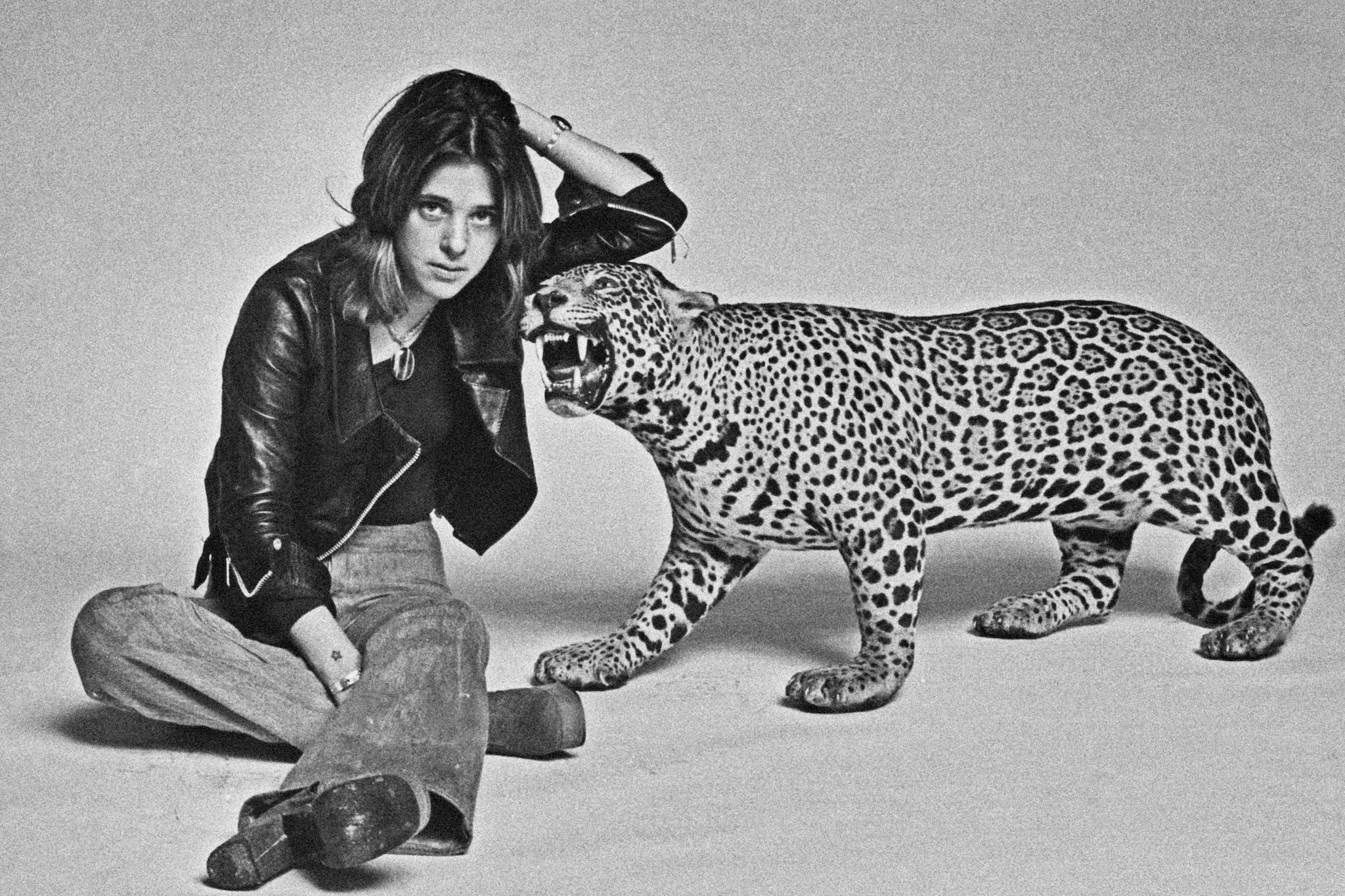
“I’m a me-ist, not a feminist,” she declares. “I don’t need to join a group to be powerful. I’m powerful within myself so I’ve transcended that. I stand up for women and I’ve proven by example. I don’t do gender – and I don’t do barriers. I’m more of a tomboy and so I never questioned it. I never thought of myself as a girl musician.” Whether or not Quatro saw them herself, barriers certainly did exist – but perhaps it was her blindness to them, which allowed her to smash them so defiantly. Does she believe there’s too much emphasis on gender now? “I think it’s just gone a bit mad. I mean, there are girls, there are guys and there are trans and there are gays; there are all these things,” she says. “Why do we need to make a song and dance about it? Why can’t we just be who we are and get on with our lives?”
Quatro found her own way to deal with “jerks” in the industry. “I very quickly developed a razor-sharp tongue; I could say one line to the jerk, and he’s finished, goes out with his tail between his legs,” she says. “I can kill a man at 10 paces if I want to.” Having a smart mouth is one thing but knowing when to deploy it is another. “It was a live TV show and I had just won Rear of the Year ’82 so before I sat down, the host Russell Harty asked to see it, so I turned around – and then he swatted it! My normal reaction would’ve been to hit him but I’m on live TV and I’m a professional, so I let it go. If I had made a big stink of it, the press would have turned on me to say how precious I am.” Make no mistake, “If he had done it backstage, he would have been on the ground.”
Another man to narrowly escape Quatro’s wrath was AC/DC’s Angus Young. “He was the only one I ever forgave,” she says. “I was walking up the stairs in my leather suit in front of him. He was ass-level and he pinched it. I turned around with my fist raised but he was so cute, he said ‘Sorry, I couldn’t help myself…’ and I could tell he meant it, so I let it go.” She pauses a second to mimic his puppy dog eyes. Like butter wouldn’t melt.

Rear of the Year probably wouldn’t fly in today’s cultural climate, I laugh. “What do you mean?” asks Quatro, genuinely puzzled. Well, you know, the objectification of women’s bodies like that. “Oh no, I was happy with it! I don’t have a problem with the prize. I’ve always had a nice ass. I try to back into a room whenever I can.” She smiles, going on to tell the story of how when she was 11, she had overheard one of her older sister’s boyfriends whisper that she was going to have a “great ass” when she grew up. “It confused me, so I went into my bedroom, undressed, bent over and peered between my legs to see what they were talking about. So no, it’s fine. I don’t mind them recognising it. In fact, I’m quite proud of it!”
Quatro is a natural-born storyteller. It’s a skill that serves her well, given the wealth of stories she has to tell. Let’s start with Prince Charles, who, in either ’85 or ’86 (around the time the future King began cheating on Diana with old flame Camilla), told Quatro – dressed in corset and fishnet tights – that she had the best legs since Tina Turner. “I went bright red in the face. I turned into a six-year-old, blushing little girl,” she recalls, girlishly crossing her legs. Or the time she broke Alice Cooper’s nose when they were on tour together. “We were letting off steam with a dart-gun fight in the hotel corridor,” she says. “Alice has got rather a large nose and I’m a good shot. I’m a really good shot. That night, he went out on stage with a black eye, wearing my T-shirt out of respect.” Or the time she said no to meeting her all-time hero, Elvis Presley.
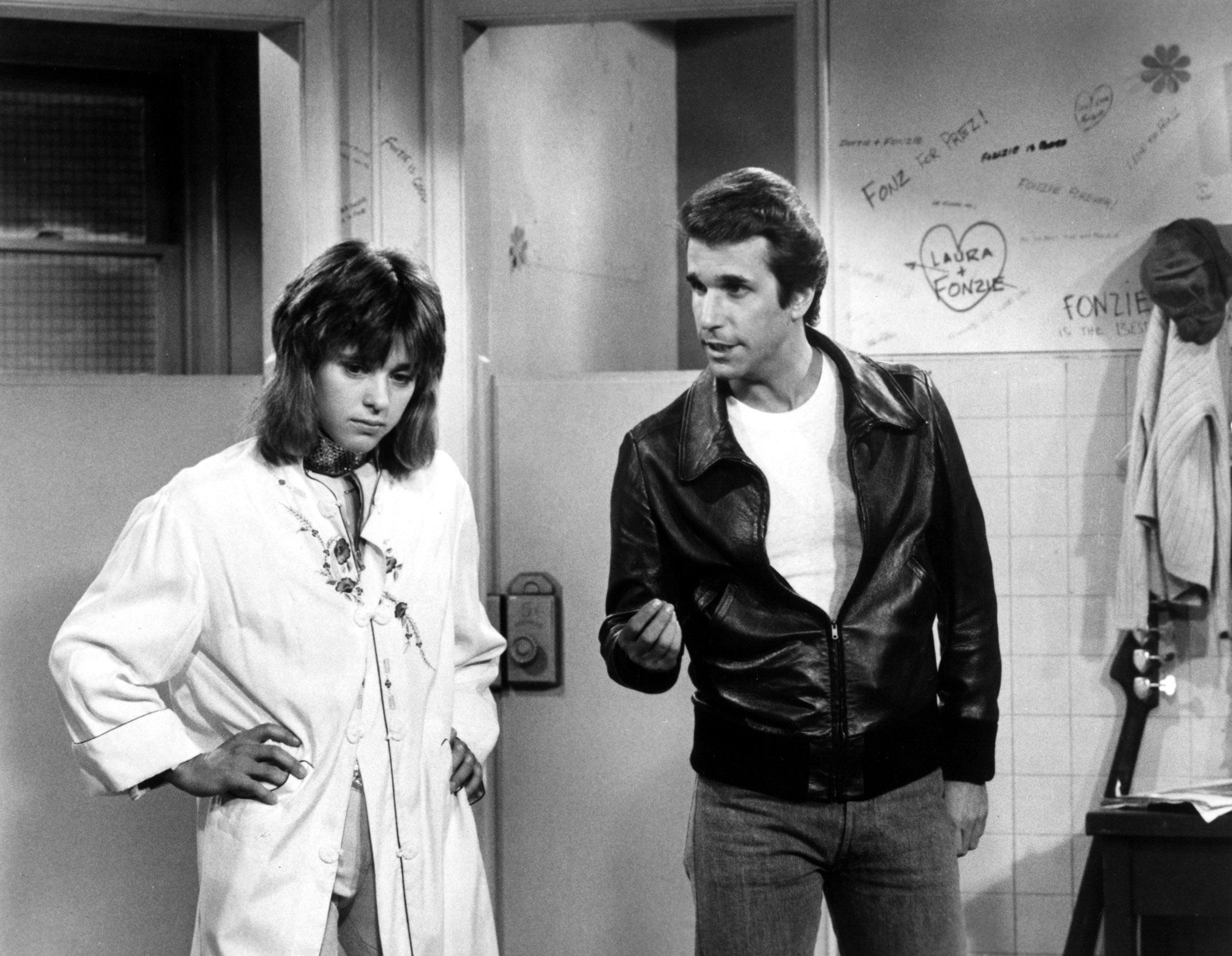
Quatro was 24 years old, on tour in Memphis when the King beckoned. “I thought I would die,” she says on hearing Presley’s voice garbling down the line. “He told me, ‘I heard your version of “All Shook Up” and I think it’s the best since my own, so I’d like to invite you to Graceland while you’re in town,’” she says. “But I wasn’t ready, so I told him I was too busy.” Quatro shakes her head, chastising her past self for just a second before returning to her idea of the path. “That was the way it was supposed to happen; I wasn’t supposed to meet him. I think it was better how it went.”
It took me playing Leather Tuscadero in ‘Happy Days’ for the Americans to discover me
Even as Quatro was enjoying huge success in the UK, fielding calls from rock’n’roll royalty and selling out arenas, the States was a different story. “I was before my time there,” she explains. “They were playing Eagles and Linda Ronstadt on the radio then.” It wasn’t until Quatro branched out into acting that she found a foothold in her home ground. “It took me playing Leather Tuscadero in Happy Days for the Americans to discover me,” she says of her recurring role on the hit sitcom as the younger sister to Pinky, an old flame of Fonzie’s. Quatro stays in touch with Henry Winkler and Ron Howard over email. “We’re still good, good friends,” she says. “Great guys.”
Quatro’s mother, who was her “moral compass”, died in 1992 of cancer. It was here on her last visit to the UK, in the garden outside, Quatro points through the window, that she had told Quatro she regretted letting her go so young. “I asked her why she didn’t just say no, and she said that sometimes love is letting go,” Quatro says. Looking back, does Quatro agree 21 was too young to leave home for a life on the road? “Yes, I came out of that ‘cared-for’ innocence too quickly. I had it and then bang, suddenly I’m in a band fending off jerks, but I had no other choice. I had to go.”
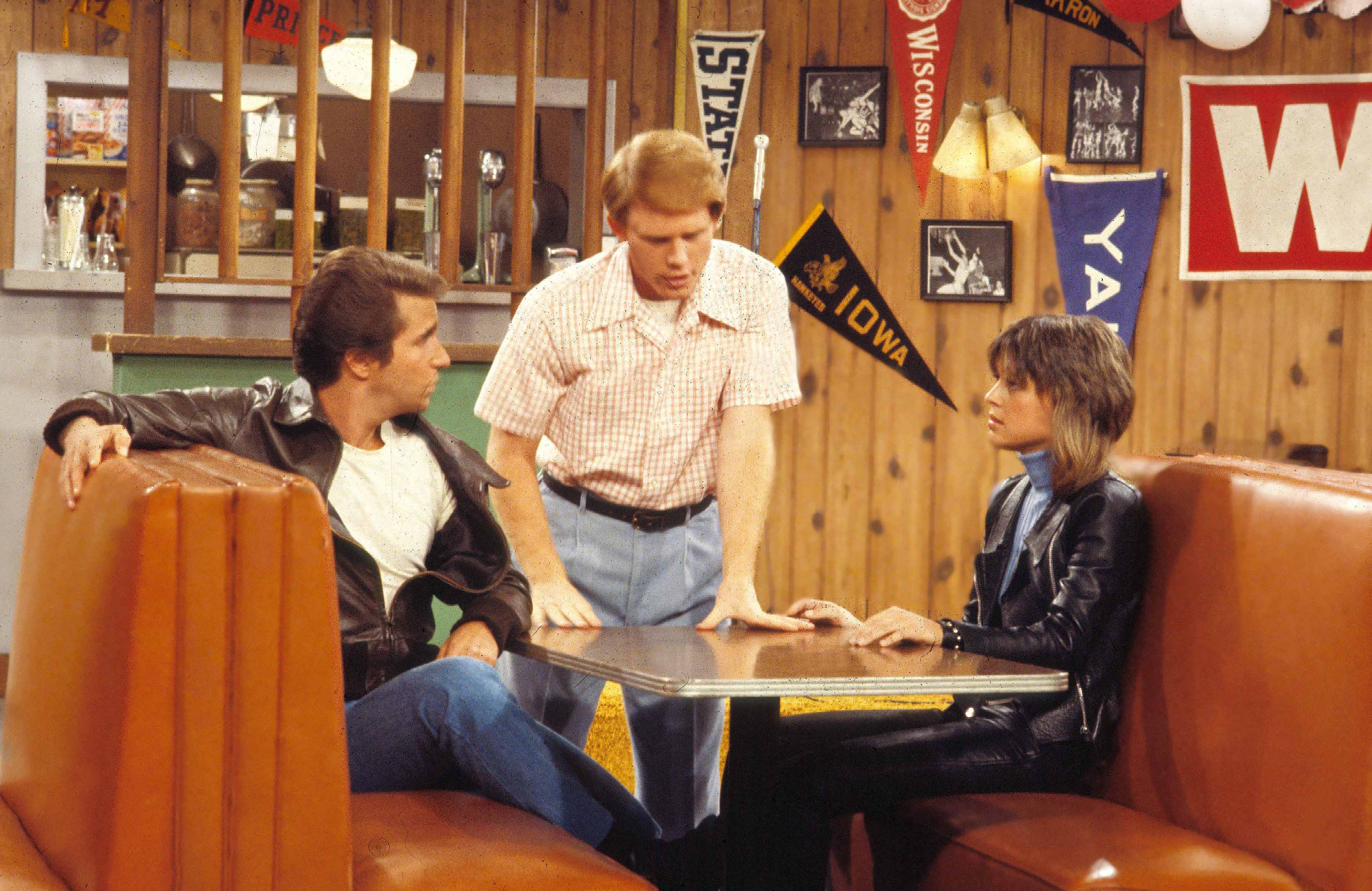
Her parents could at least take some comfort in the knowledge that Quatro only ticked off the last part of the “sex, drugs and rock’n’roll” cliché. “I’m not going to say I never tried drugs. Of course, I did – it was the Sixties and everybody was puffing weed, but it doesn’t agree with me,” she says. Quatro attended a “pot party” once and was never invited back. “It made me feel like I was on speed, which was so not the vibe!”
The same year that she lost her mum, Quatro divorced her husband and bandmate Len Tuckey. “I think we were too much together 24/7 and we started to go our separate ways.” Quatro says. Her aspirations beyond music – venturing into musicals and books and acting – was a problem for Tuckey. “I don’t think he liked that very much, but I don’t like to be boxed in,” she says. “If I keep the leather suit on, it’s out of choice.” The divorce got ugly, as they often do, but once the dust settled, she found there was still love between them. “It had just changed shape.” You know what’s funny, Quatro goes on to say, “I’ve had 15 or 16 marriage proposals in my lifetime but the only men I’ve married are the ones that I’ve asked myself.”
Don’t ask me why but there’s something about Scarlett Johannson that connects with me
She has been happily married to her second husband Rainer Haas for 30 years now. Today, the concert promoter is pottering about somewhere in this big old house but most of the time he lives in Hamburg while Quatro resides in Essex; it’s an arrangement that works for them. “We have a neutral apartment in Mallorca,” she smiles. It was with Haas that she had those famed six-hour sex sessions she wrote about in her 2008 autobiography. “He was reading a draft and he said, ‘Oh! You can leave that part in!’” she erupts with laughter. “God, I wouldn’t want to have that now. Too long… way too long. 15 minutes is enough! Wham, bam, thank you ma’am.”
There are talks about making Quatro’s life into a movie. First, though, they must find someone to play her. “This isn’t speaking from ego, but I have a vibe,” Quatro says. “I don’t know what it is, and I can’t explain it to you, but I know that I have it.” The challenge then, is finding someone else with said vibe. After spending an hour with Quatro, I can concur this could be a long search. But if she had to name an actor right now? “Scarlett Johansson,” she responds instantly. “Don’t ask me why but there’s something about her that connects with me.” She’d look great in a mullet, I suggest. “God, she looks great in everything. Gorgeous girl.”
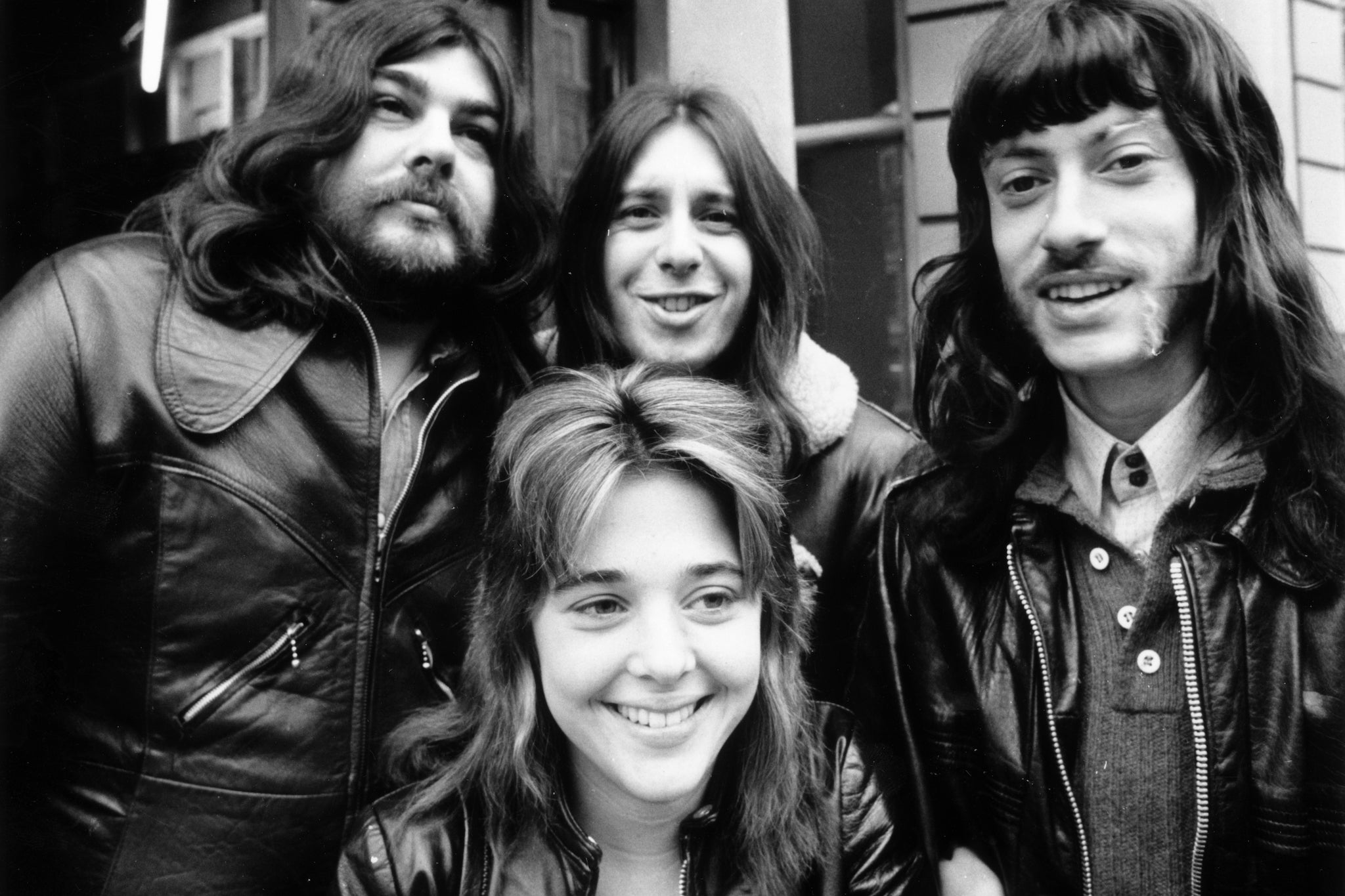
Quatro tells me she herself “didn’t grow up with looks in my arsenal”. Sensing I’m about to disagree, she continues: “I don’t mean that I didn’t look good, but it just wasn’t important to me. And I was never told I looked good – which, by the way, I think is terrific, because here’s my theory: if I had grown up thinking I looked OK and then I became the pin-up that I became, that could’ve messed with my brain. It was a blessing in disguise because it kept the ego in check.” She cracks a smile, “But yeah I was cute – damn!”
My time is up and Quatro offers to drive me back to Chelmsford station – Pat hitches a ride, too – but not before she gives me a look at her storied Ego Room. “Mind your head,” warns a red sign above the rickety door, which opens into a burst of rock’n’roll memorabilia. There are vintage photos and faded concert posters. Old costumes and ripped setlists. Predictably, a lot of leather. Noticeably, though, alongside the old there are new additions, too. The Ego Room is not some crypt built to house the remnants of a finished career. It is, like Quatro, alive and kicking. “The first time I got asked if I was retiring, I was 35,” she rolls her eyes. “And at 73, I’m still not ready.”
Suzi Quatro is on a UK tour in November to celebrate the 50th anniversary of ‘Can the Can’






Join our commenting forum
Join thought-provoking conversations, follow other Independent readers and see their replies
Comments